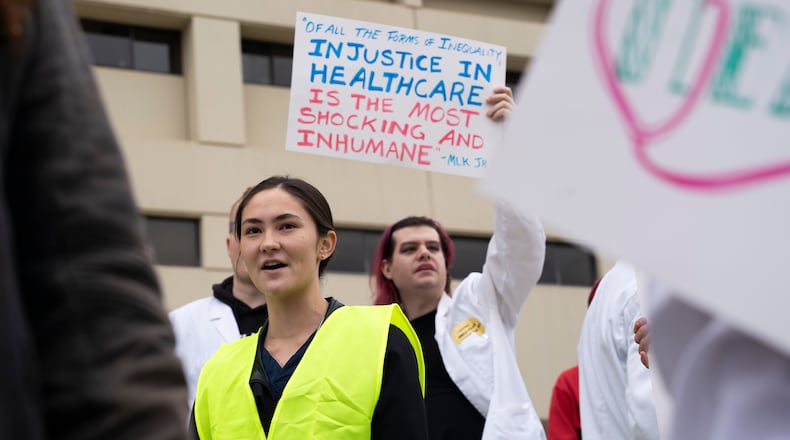Georgia has a health insurance coverage gap crisis. By failing to ensure adequate health care access for our citizens, we risk losing physicians to more competitive states.
Since the passage of the Affordable Care Act in 2010, all but 10 states have expanded Medicaid coverage to people with low incomes who do not qualify for marketplace health insurance plans. Georgia is one of the few that has resisted expansion, leaving federal funding on the table and allowing an increasingly large proportion of its population to lose access to health care.
Thirteen percent of the state’s residents — or 1.4 million Georgians — are uninsured, the third-highest rate in the country. That rate remains largely unchanged despite the Georgia Pathways to Coverage Program, which was introduced in July 2023 as a way to expand insurance access but that has only enrolled around 1% of the 100,000 Georgians that the state anticipated for the first year of implementation. Part of the reason this program has failed is because Pathways introduced burdensome work requirements that create extra steps for patients to qualify for coverage. To make things worse, the Pathways program is costing our state more money than an outright expansion. Rather than return to the drawing board to create a better solution to help uninsured Georgians, some of our state’s most influential leaders have chosen inaction. Gov. Brian Kemp recently stated that he is outright opposed to Medicaid expansion, despite growing bipartisan support from Georgia state legislators in 2024 to consider it.
As medical trainees and future physicians, we see how this coverage gap crisis and the continued lack of meaningful solutions have harmed patients and degraded the working conditions in our state’s medical system. Physicians often bear the Sisyphean toll of trying to make our flawed system work for our patients. Attempts to promote health in a system that sets up roadblocks for routine care is taxing for trainees and seasoned physicians. Uninsured patients without routine access to health care or means to pay for medications will repeatedly wind up in the emergency room. Once they are stable enough to be discharged, patients risk being readmitted because they are often unable to find follow-up appointments, rehabilitation, or the medications they need to stay healthy. Seeing so many of our patients get sick and die from preventable causes contributes to burnout, a seemingly endless feeling of emotional fatigue due to workplace stress. Burnout can cause physicians to lose empathy for their patients and feel dissatisfied in their jobs. It can also push physicians to leave clinical practice.
Unfortunately, burnout and lack of career incentives are already turning physicians away from areas in need.
In 2020, our state had one doctor for every 424 state residents, ranking 38th in the country. In rural areas, Georgia’s refusal of health care funding has caused hospital closures and limited physician availability. This issue has been explored emotionally in the documentary “The Only Doctor,” which follows the only doctor serving Clay County as she struggles to provide care to the region’s large population of uninsured, rural residents. Without adequate funding cycling through the rural medical economy, jobs and opportunities in health care will continue to be lost, as will lives.
The University System of Georgia Board of Regents announced this year the approval of a new medical school in Athens. The creation of a second public medical school is a welcome development and will certainly open doors to students who plan to return to practice in their home communities across the state.
However, based on a survey we conducted this spring, Georgia risks losing these physicians to more competitive states, where they can provide better care to patients and find better working conditions for doctors. In our survey of 243 Georgian medical students and residents, we found that 60% of trainees would be more likely to stay in Georgia if the state had better access to insurance coverage. Furthermore, 81% of trainees felt most residents of the state do not have access to quality care, and 80% of trainees believe that our high uninsurance rate contributes to physician burnout. 77% stated that it was important for them to be able to accept Medicaid insurance as practicing physicians.
Georgia has much to offer young medical trainees: a growing state economy, diverse patient populations and innovative opportunities at leading academic medical centers. By embracing inaction, the state is not only failing our most marginalized patients, but it is also giving young physicians an incentive to seek opportunities elsewhere. We cannot afford further dithering and indecisiveness. The time to fix our health care system is now.
Rebecca Hong is a fourth-year medical student in Georgia and president of Health Students Taking Action Together. She will be starting her residency in obstetrics and gynecology in July. Benjamin Williams is a fourth-year medical student at Emory University School of Medicine. He will be starting his residency in neurology in July. Brendan Pulsifer is a third-year medical student at the Emory University School of Medicine and vice president of Advocacy of Health Students Taking Action Together.
Keep Reading
The Latest
Featured



